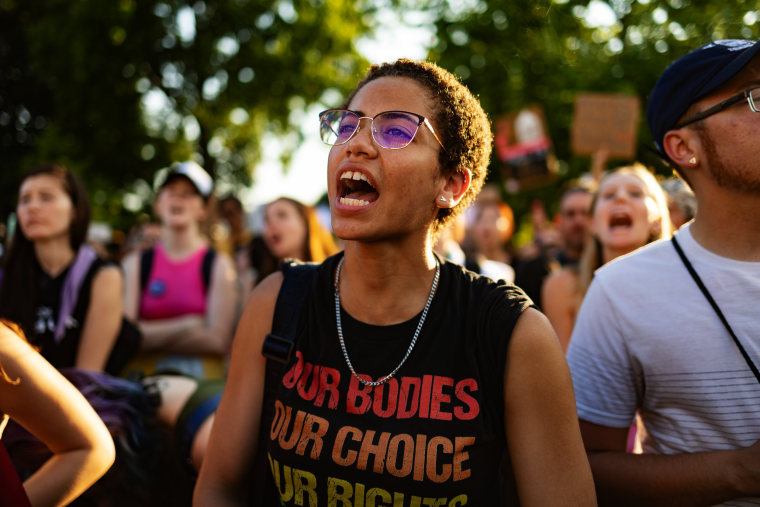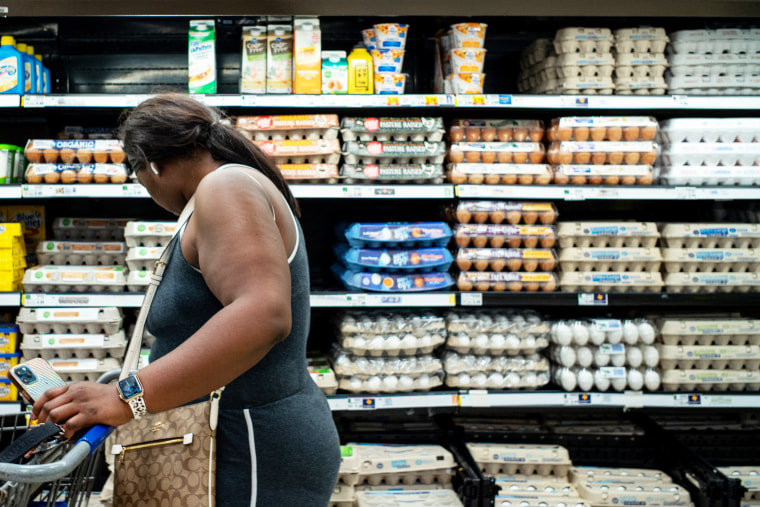A new national poll of Black women voters reveals a demographic that is highly motivated to vote in the 2022 midterm elections, with an overwhelming majority citing “pocketbook” issues, like the cost of housing and groceries as core concerns. Among this well-established key voting bloc, reproductive rights and crime/gun violence also emerged as concerns.
Change Research conducted the online survey of 715 adult Black women voters who were recruited through web and text messages. The poll, which was conducted from Sept. 29 to Oct. 4 and had a 4% margin of error, was commissioned by Higher Heights Leadership Fund, a nonprofit organization that is associated with Higher Heights for America PAC, a political action committee that works to elect Black progressive women nationwide.
In the survey, respondents provided one word or phrase to describe Black female representation in politics before the pivotal midterms next month, which will determine which party will control Congress and statehouses around the country. The majority of Black women who responded said they believed they were “underrepresented,” or that “more representation” was needed. Nearly two-thirds (67%) said they were more motivated to vote now than ever.
The number of Black eligible voters has grown steadily in recent years and is projected to reach 32.7 million by November, according to a Pew Research Center report. Black women represent 53% of Black eligible voters, slightly higher than all eligible voters (51%) in the country.
The Higher Heights survey found a plethora of issues that could drive Black women to the polls next month. A majority (76 %) of Black women said they were “extremely worried” about inflation and rising costs of everyday essentials — namely, rent and housing, groceries, gas and affordable health care. One-third (33%) cited rising costs of rent and housing as their top concern, including 36% of those under 50.
Pocketbook issues ranked one and two, while reproductive justice ranked a distant third (21%) followed by rising crime and gun violence in fourth (17%) among respondents. However, those weren’t the only concerns. According to the data, women polled also cited policing, voter suppression and climate change.
“A multitude of issues are of deep concern to our community, from the rising cost of housing and other basic goods to restrictions on abortion access, to threats to honest education for our children,” Glynda Carr, president and CEO of Higher Heights, told NBC News. “Black women are not single-issue voters — we sit at the intersection of the most pressing issues facing our nation.”
The Higher Heights survey also asked Black women to share how they feel, at this moment in history, about being a Black woman in America. Many gave mixed answers, expressing both excitement and optimism about the advances Black women have made and their power, as well as frustration about the state of the country and how Black women are treated.
Similar viewpoints have cropped up in other national surveys, among them the annual Black Women’s Roundtable and Essence “Power of the Sister Vote” poll. Conducted by Brilliant Corners Research & Strategies, its interviewers surveyed 601 women by phone between Feb. 28 and March 6. Respondents to the poll, which had a 4% margin of error, said the midterm election should be about improving the economy (34%); combating discrimination and systemic racism (33%); and protecting voting rights as well as democracy (28%). Notably, this poll showed for the fourth year straight that racism registered as a top concern for Black women.
Aimee Allison is founder and president of She the People, a California-based nonprofit organization that seeks to elevate the voices of women of color and foster political power.
In tandem with the University of Southern California, She the People recently held a 10-state listening tour in which its leadership met with women of color in Florida, Texas, Georgia, Ohio and other battleground states.
“Black and brown women are arguably the least listened to, but most influential voters,” Allison said. “Having honest conversations gave us some sense of the pitfalls and possibilities of this coming election.”
The economy was much on the minds of the women she met during the tour. “Food, gas, housing, and the cost of living overall,” Allison said. “Part of that is being paid fairly and earning a living wage. Women want to be able to live a life of dignity, and they want answers to how elected officials in government can help them.”
In state after state, Allison said health care was a core concern for women of color. Maternal health and reproductive justice, she said, were encompassed under that umbrella. “Abortion [access], we heard, was part of a larger intersectional issue.”

This pivotal election comes at a time when record numbers of Black women are running for office. Higher Heights recently released a searchable, online database called #BlackWomenRun that details more than 500 Black women candidates in the general election at the local, state, and federal levels this midterm cycle.
According to the Center for American Women and Politics, part of the Eagleton Institute of Politics at Rutgers University, Black women from both major parties have also set new records this year in terms of filing as candidates for the U.S. House of Representatives, U.S. Senate and governor.
While there has never been a Black woman elected governor in the U.S., history could be made this cycle. Democrats running for office include Georgia gubernatorial candidate Stacey Abrams, and Iowa gubernatorial candidate Dierdre DeJear. The GOP has no Black women candidates in the general election for governor, but Angela Underwood-Jacobs is a Republican nominee for lieutenant governor of California. Rayla Campbell of Massachusetts is among the Black Republican women running for secretary of state.
Both major parties have multiple Black women candidates seeking House seats. There are no Black women in the Senate after Kamala Harris, formerly a senator from California, became vice president. Current Black women candidates for that chamber include Rep. Val Demings, D-Fla.; Cheri Beasley, the former chief justice of the North Carolina Supreme Court; and Natalie James, a community organizer in Arkansas. In major metropolitan areas, Rep. Karen Bass, D-Calif., is a Los Angeles mayoral candidate, while Stacia Hall is a Republican candidate for mayor of Washington, D.C., facing Mayor Muriel Bowser, who’s up for re-election.
Earlier this month, #WinWithBlackWomen, an intergenerational collective of Black women leaders and advocates, hosted a midterm election event.
The gathering highlighted “the power of Black women and men, especially when it comes to our impact on elections,” said Jotaka Eaddy, a social impact strategist and founder of the group.
“Reproductive, voting and civil rights are on the ballot, all of which will have the greatest impact on Black Americans. Together we are committed to galvanizing the collective momentum built over the last two years to impact this election and most importantly bring impact to the communities in which we live and serve.”
